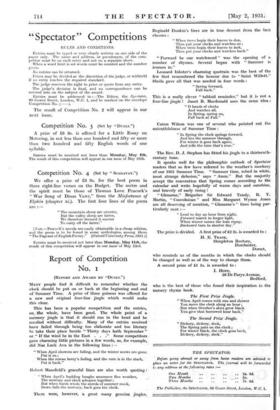" Spectator " Competitions
RULES AND CONDITIONS.
Entries must be typed or very clearly written on one side of the paper only. The name and address, or pseudonym, of the com- petitor must be on each entry and not on a separate sheet.
When a word limit is set words must be counted and the number given.
No entries can be returned.
Prizes may be divided at the discretion of the judge, or withheld if no entry reaches the required standard.
The judge reserves the right to print or quote from any entry. The judge's decision is final, and no correspondence can be entered into on the subject of the award.
Entries must be addressed to :—The Editor, the Spectator, 99 Gower Street, London, W.C. 1, and be marked on the envelope Competition No. (—).
The result of Competition No. 2 will appear in our next issue.
Competition No. 3 (Set by "Duow.") A prize of £8 8s. is offered for a Little Essay on Motoring, in not less than one hundred and fifty or more than two hundred and fifty English words of one syllable.
Entries must be received not later than Monday, May 4th. The result of this competition will appear in our issue of May 16th.
Competition No. 4 (Set by " SCADAVAY.") We offer a prize of 13 8s. for the best poem in three eight-line verses on the Budget. The metre and the spirit must be those of Thomas Love Peacock's "War Song of Dinas Vawr," from the Misfortunes of Elphin (chapter xi.). The first four lines of the poem are :—
"The mountain sheep are sweeter, But the valley sheep are fatter, We therefore deemed it meeter To carry off the latter."
[Note.—Peacock's novels are easily obtainable in a cheap edition, and the poem is to be found in some anthologies, among them "The Pageant of English Poetry." (Oxford University Press, 1911.)]
Entries must be received not later than Monday, May 11th, tho result of this competition will appear in our issue of May 23rd.
Report of Competition No.
(REPORT AND AWARD BY "DUGLI.")
MANY people find it difficult to remember whether the clock should be put on or back at the beginning and end of 'Surruner Time. A prize of three guineas was offered for a new and original four-line jingle which would make this clear.
This has been a popular competition and the entries, on the whole, have been good. The whole point of a
memory jingle is that it should run in the head and be recalled without difficulty. Many of the entries received have failed through being too elaborate and too literary to take their place beside "Thirty days bath September"
or," If the wind be in the East . . ." Some competitors gave charming little pictures in a few words, as, for example, did Nae Luck Ava in the following lines :— "When April showers are falling, and the winter snows are gone, Put it on ;
When the rowan berry's fading, and the corn is in the stack, - Put it back."
Robert Mansfield's graceful lines are also worth quoting :- "When April's budding boughs announce fine weather, The mercury and clock advance together ;
But when harsh winds the shreds of summer mock, . Down falls the mercury, back goes the clock.
Reginald Donkin's lines are in true descent from the best classics :
"When trees begin their leaves to don, Then put your clocks and watches on ; When trees begin their leaves to lack, Then put your clocks and watches back."
"Forward be our watchword" was the opening of a number of rhymes. Several began with "Summer is
icumen in."
Leonard Inkster's charming quatrain was the best of the few that remembered the honour due to "Saint Willett."
Sheila gave all that was needed in four words :
"Spring forward, Fall back."
This is a really clever "tabloid reminder," but it is not a four-line jingle ! Janet B. Macdonald uses the same idea : "0 hands of clocks And watches all, In Spring, spring on, Fall back at Fall."
Canon Wilson was one of several who pointed out the untruthfulness of Summer Time :
" In Spring the clock springs forward, And lies the summer through, For winter it goes back again, And tells the time that's true."
The Rev. D. J. Stephan has fitted his jingle to a thirteenth- century tune.
It speaks well for the philosophic outlook of Spectator readers that so few have referred to the weather's mockery
of our 1931 Summer Time. "Summer time, robed in white, most strange delusion," says "Anon." But the majority accept the convention that Spring comes according to the calendar and write hopefully of warm days and sunshine, and bravely of early rising !
" Glename," Brigadier Sir Edward Tandy, R. Y.
Martin, " Cosvolnisan " and Miss Margaret Wynne Jones are all deserving of mention, " Glenarne's " lines being par- ticularly neat :—
" Lend to day an hour from night, Forward march to longer light, When winter comes the loan repay, Backward turn to shorter day."
The prize is divided. A first prize of £2 2s. is awarded to : H. E. TRASK, Steepleton Rectory, Dorchester, • Dorset, who reminds us of the months in which the clocks should be changed as well as of the way to change them. A second prize of £1 1s. is awarded to : I. HOPE, • 28 De Parys Avenue, Bedford, who is the best of those who found their inspiration in the nursery rhyme book.
The First Prize Jingle. _ "When April comes with sun and shower You move the clock along an hour ; But when October's skies grow black You give that borrowed hour back."
The Second Prize Jingle.
" Dickery, dickery, dock, The Spring puts on the clock ; For winter black, the clock goes back, Dickery, dickery, dock."




































 Previous page
Previous page